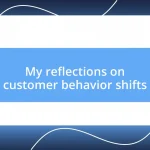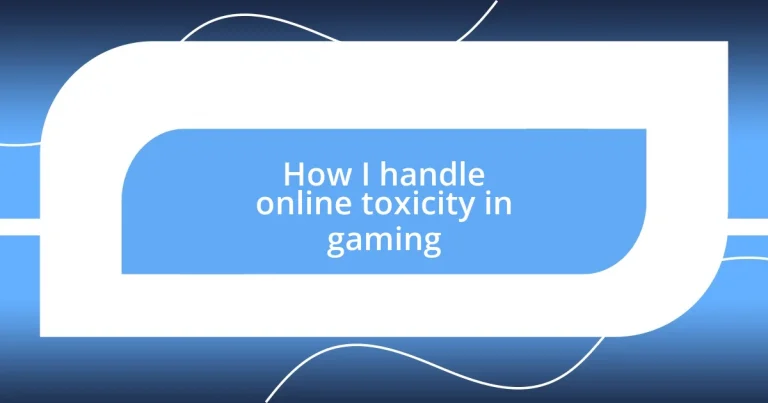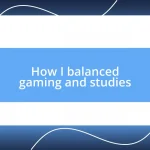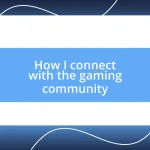Key takeaways:
- Online toxicity in gaming often stems from anonymity and can manifest as harassment, insults, or discrimination, impacting players’ enjoyment and mental well-being.
- Recognizing signs of toxic behavior, such as constant insults and blame-shifting, is crucial for fostering a supportive gaming environment.
- Implementing strategies like setting boundaries, engaging positively with others, and utilizing reporting tools can create a healthier and more enjoyable gaming experience.
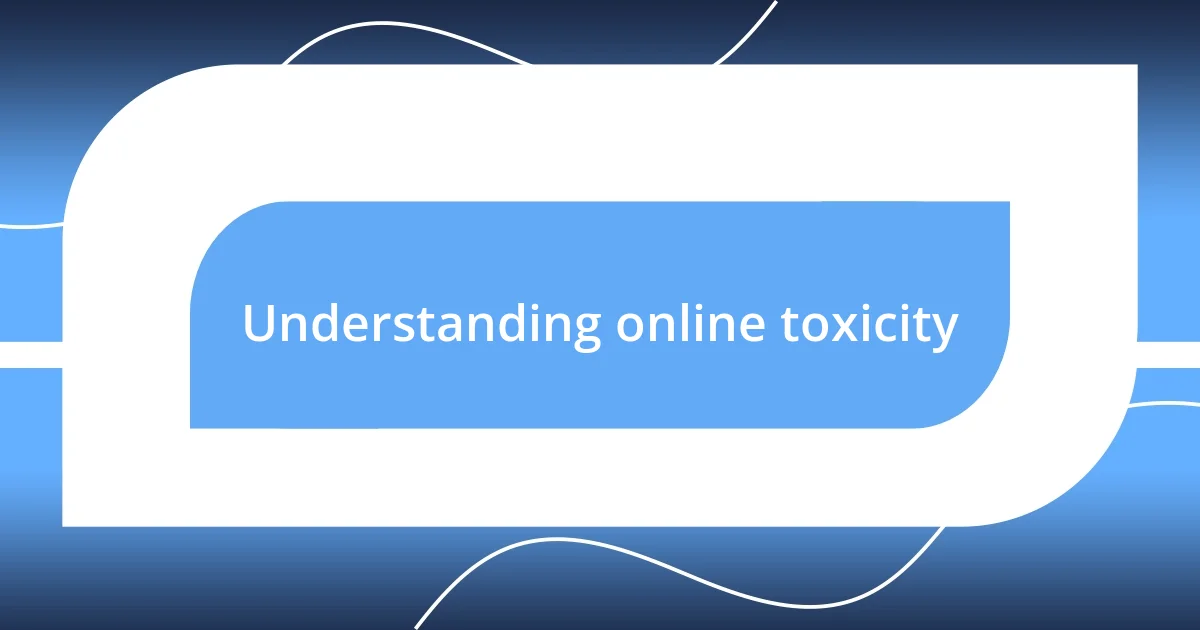
Understanding online toxicity
Online toxicity in gaming can be incredibly pervasive, often manifesting as harassment, trolling, or even overt hate speech. I remember a match where a player unleashed a torrent of insults toward another for simply making a mistake. How can we hold such a toxic mindset when gaming is meant to be enjoyable and inclusive?
When I think about the reasons behind this behavior, it seems rooted in anonymity. The idea of hiding behind a username can embolden individuals to express hateful sentiments they might never voice in person. It makes me wonder, what drives people to discard basic respect for others in a virtual space?
I’ve felt the weight of toxicity firsthand, and it’s disheartening. Having teammates ridicule you can drain the joy from a game. It asks the question: why do we allow ourselves to get caught up in this negativity when we can create a more supportive environment? Understanding the dynamics of online toxicity is crucial if we want to foster a gaming community that values respect and kindness.
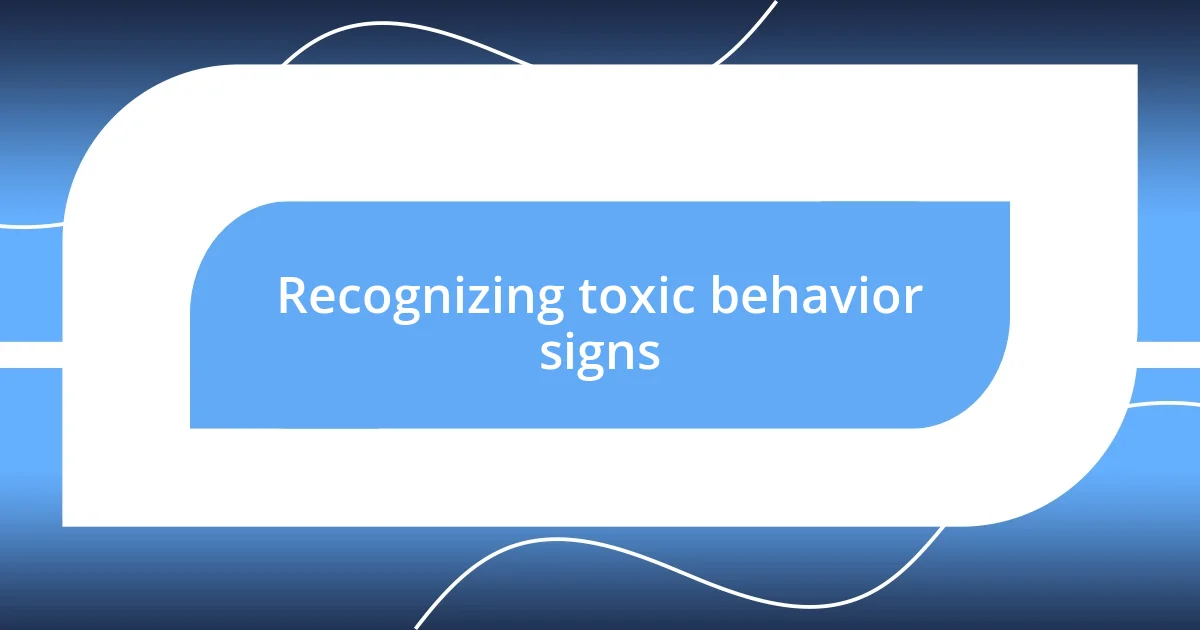
Recognizing toxic behavior signs
Recognizing toxic behavior in gaming isn’t always straightforward, but I’ve come to notice several unmistakable signs. During one gaming session, a teammate started disparaging others’ skills rather than offering constructive feedback. It was a clear signal of negativity bubbling beneath the surface. When you hear comments that undermine your teammates or promote a blame game, it’s a red flag that toxicity is rearing its ugly head.
Here are some common signs of toxic behavior to watch for:
- Constant insults or derogatory comments toward players
- Excessive trash-talking beyond friendly banter
- Using discriminatory language or hate speech
- Spamming the chat with offensive messages
- Blaming teammates for every loss instead of sharing responsibility
The reality is, these behaviors not only disrupt the flow of the game but also create a hostile environment that can be incredibly draining. I personally believe recognizing these signs early can help us address them before they escalate.
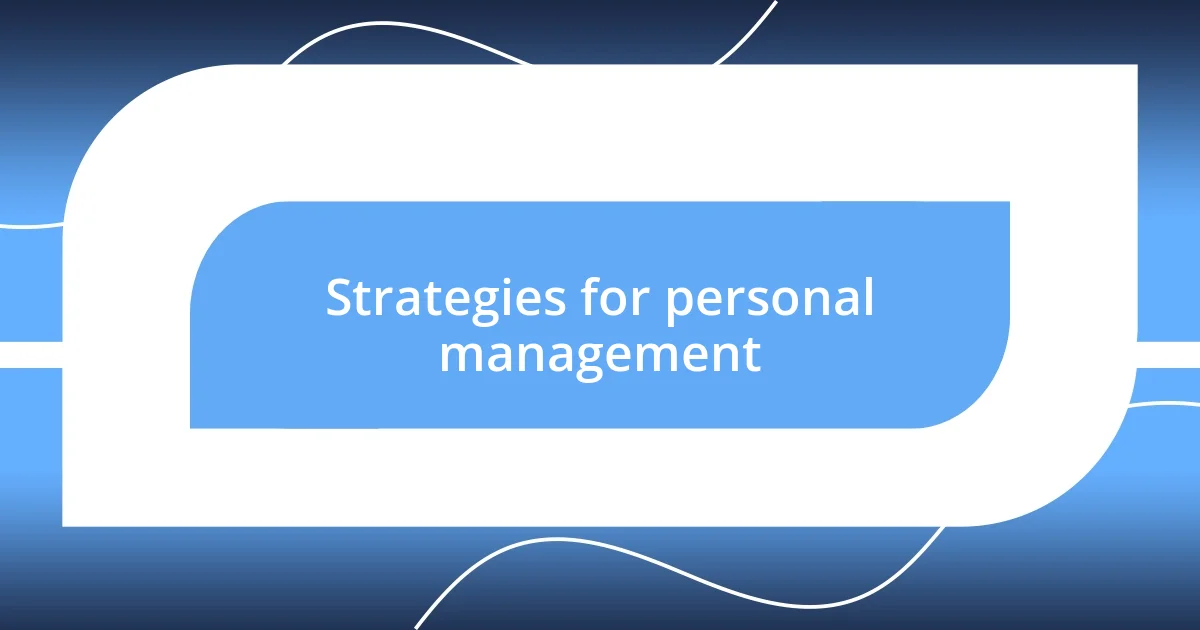
Strategies for personal management
Understanding how to manage personal experiences with online toxicity in gaming is essential for maintaining enjoyment and mental well-being. One strategy that’s worked wonders for me is setting boundaries. For instance, I’ve made it a habit to mute or block players who engage in toxicity right off the bat. This not only protects my gaming experience but also sends a clear message that I won’t tolerate disrespect. Each time I do this, I feel a sense of empowerment that allows me to focus on enjoying the game rather than responding to negativity.
Another technique I found incredibly helpful is practicing self-reflection after each gaming session. There’s something therapeutic about taking a step back to process what happened during gameplay. Did a toxic comment ruin my day, or did I manage to shake it off? I often jot down my thoughts in a journal, which helps me sort through my emotions. By identifying specific triggers, I can develop strategies to deal with them in future encounters—making each gaming experience less stressful and more fulfilling.
Engaging positively with the gaming community is also something that I’ve adopted wholeheartedly. By focusing on forming connections with supportive players, I create an environment that nurtures respect and kindness. I try to uplift others during games, even when facing toxicity. For instance, I once made a point to compliment a teammate’s strategy after a rough match. It not only changed the atmosphere but made us all feel valued. It’s this ripple effect of positivity that can transform our gaming experiences.
| Strategy | Description |
|---|---|
| Setting Boundaries | Muting or blocking toxic players to protect your experience. |
| Self-Reflection | Journaling thoughts after gaming sessions to process emotions. |
| Engaging Positively | Building connections with supportive players to foster a positive atmosphere. |
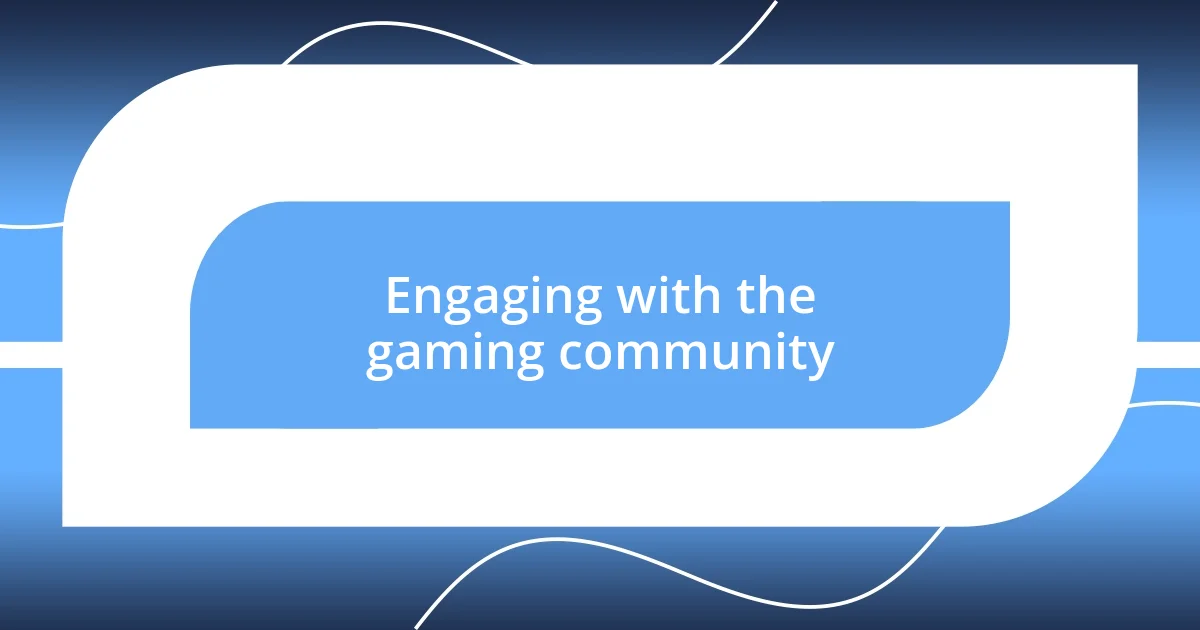
Engaging with the gaming community
Engaging with the gaming community has been one of the most rewarding aspects of my gaming journey. I remember a time when I joined a new online squad, and instead of the usual banter, we focused on sharing tips and celebrating each other’s victories. Creating this positive culture made me realize how much more enjoyable gaming becomes when everyone uplifts one another. Isn’t it amazing how a simple shift in tone can change the entire vibe of your gaming experience?
I’ve also found that getting involved in community events can strengthen connections with like-minded players. Last summer, I participated in a charity stream with fellow gamers, where we united not just to play, but to make a difference. The energy was electric as we all rallied together for a cause. This shared purpose fostered camaraderie and reminded me of the genuine friendships that can bloom through gaming. It brings to mind the question—why settle for toxicity when we can build a community that thrives on collaboration?
Additionally, I’ve learned that using positive reinforcement in chat not only reflects my values but also encourages others to do the same. One evening, during a heated match, I noticed that the mood was turning sour. I made a conscious effort to acknowledge a player’s well-timed move, and surprisingly, the tension dissolved almost instantly. It’s moments like these that illustrate the power of positivity. Filling the virtual space with encouragement opens doors for meaningful interactions and can significantly diminish the prevalence of toxic behavior.
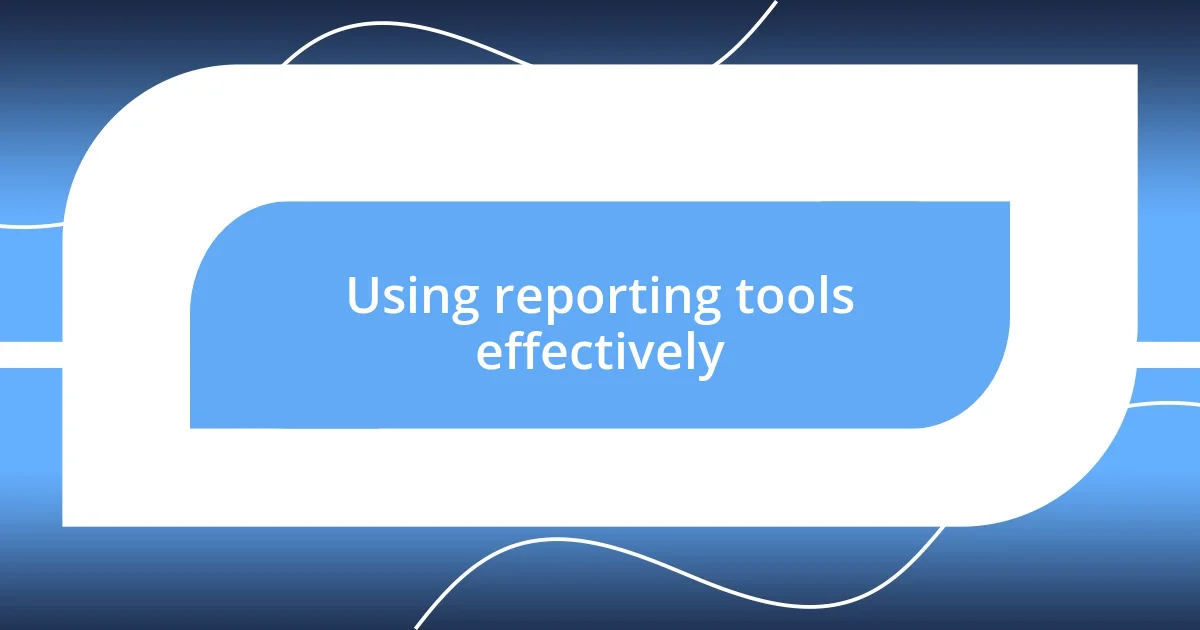
Using reporting tools effectively
Using reporting tools effectively has been a game-changer for me. In my experience, knowing how to properly utilize the reporting features in a game can significantly impact my overall experience. For instance, during one particularly frustrating match, I encountered a player who was relentlessly rude. Rather than letting their negativity consume my game, I took a moment to calm down and then used the reporting tool to flag their behavior. The process felt empowering—like taking a stand against toxicity.
I’ve come to realize that reporting isn’t just about addressing issues; it’s about creating a healthier gaming environment for everyone. After I reported that rude player, I opted to share my experience with fellow gamers, encouraging them to speak up, too. When we all contribute to making our games more inclusive and respectful by utilizing available tools, we foster a community that values kindness over cruelty. This sense of collective action not only raises awareness but also reinforces that we’re all in this together. Have you ever wondered how many toxic behaviors go unreported simply because players feel helpless? By taking that small step to report, you’re helping to change the narrative.
Additionally, I’ve learned that constructive feedback in reports can lead to better outcomes. When I’ve reported someone, I make sure to be specific about their actions. For instance, I’ll mention if they used hate speech or engaged in harassment. This not only aids the game developers in addressing problematic behavior but also highlights the importance of accountability. I’ve noticed that when we provide detailed insights, it can lead to meaningful changes in the gaming community. What if every player took the time to report toxic behavior thoughtfully? Imagine the positive shift we could create together.
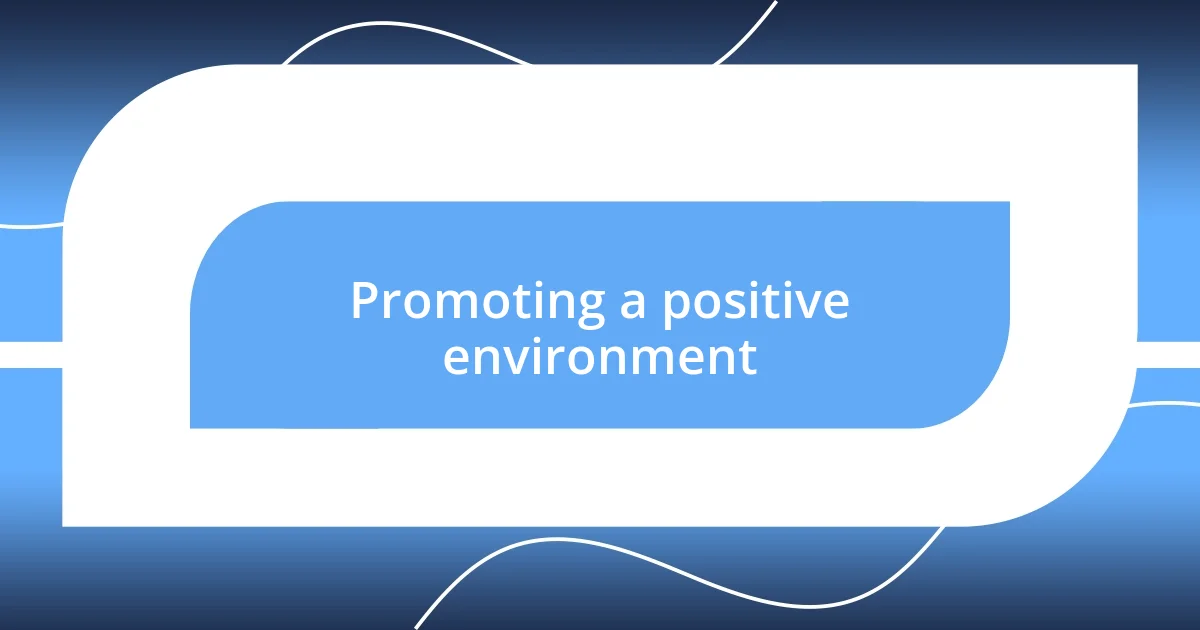
Promoting a positive environment
Creating a positive environment in gaming is something I hold dear. I recall a gaming night where my friends and I threw out the typical competitive spirit and embraced a fun-first approach. We decided to set friendly challenges with silly penalties for losing, like singing a song or performing a funny dance. The laughter that erupted made every match unforgettable, demonstrating that humor can be the best antidote to tension.
I also think it’s crucial to lead by example. During one particular game, a player was getting frustrated and began to lash out at teammates. Instead of joining in or staying silent, I took a moment to step back and shared a light-hearted joke about our situation. I noticed that the player’s mood shifted—that little dose of positivity created a ripple effect. Have you ever noticed how one small change in attitude can completely transform the group dynamic?
Furthermore, I regularly express gratitude in chat, reminding everyone of the efforts their teammates put in. I’ve found that saying, “Thanks for that great play!” not only boosts others’ spirits but also encourages everyone to keep that cycle of support going. I often wonder—what if we all made it a habit to highlight each other’s strengths? Just imagine how much more inviting and enjoyable our gaming spaces would be if a culture of appreciation took root.
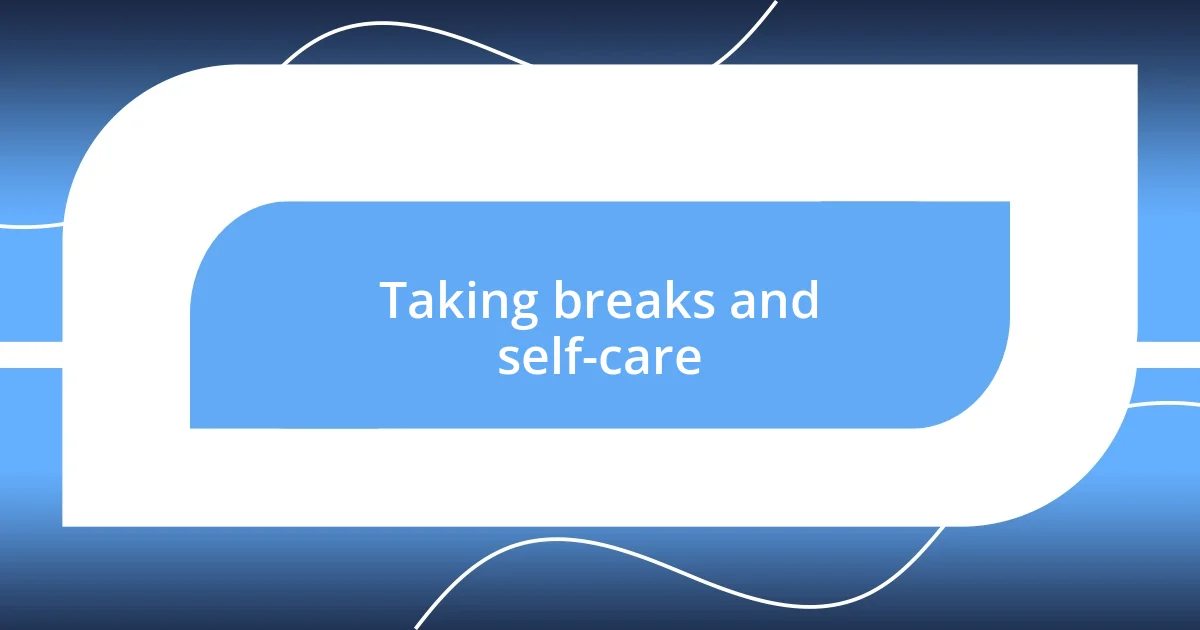
Taking breaks and self-care
Taking breaks is essential for maintaining mental clarity while gaming. I remember one session where I got caught up in an intense multiplayer match and lost track of time. After a few frustrating rounds, I ultimately realized that stepping away for ten minutes helped me reset my mindset. That brief respite allowed me to return with a fresh perspective and more enjoyment, which is something every gamer should consider. Have you ever noticed how a short break can transform your mood?
Self-care doesn’t have to be complex. Sometimes, I just indulge in a quick stretch or grab a snack while letting the game pause. Those moments, even when they seem minute, remind me that my health comes first. I’ll often reflect on how balancing gaming with self-care—not just diving into the next challenge—really enhances my overall experience. What’s your go-to way to recharge during a gaming session?
I’ve also found that setting boundaries around my gaming time has been a game-changer. When I prioritize self-care by designating specific gaming hours, I actually enhance my enjoyment and performance. There was a time when I would binge-play late into the night, but I quickly realized that the next day was a drag. Now, I embrace a healthier routine that allows for relaxation and self-reflection, enabling me to return to gaming invigorated. Isn’t it amazing how creating a structured practice can lead to longer-lasting enjoyment?
